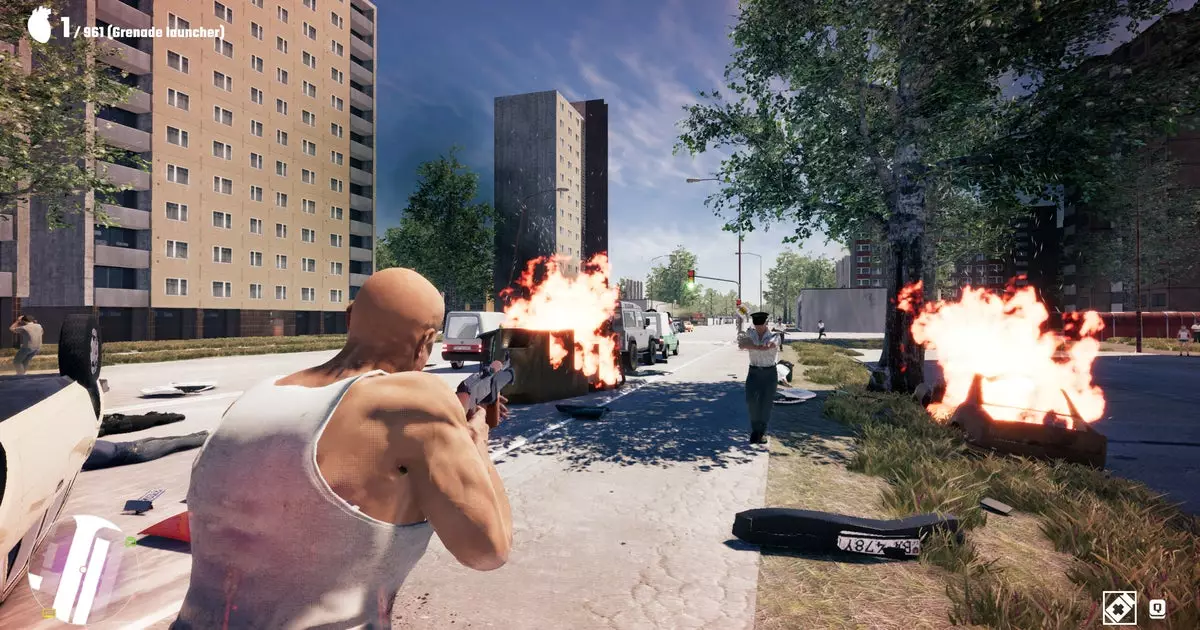The gaming landscape has long been dominated by towering giants like Rockstar Games, with their iconic Grand Theft Auto (GTA) series setting a benchmark for open-world action titles. When new games emerge claiming to offer an alternative to this beloved franchise, anticipation is natural. Vivat Slovakia, an early access title, has drawn considerable interest as an homage to the GTA series. However, after experiencing its early build, a stark realization has set in: this game, while ambitious, may not be the revolutionary experience some hoped it would be.
Vivat Slovakia aims to envelop players in a fictional rendition of ’90s Slovakia, where corruption reigns and the law struggles to maintain order. The protagonist, Trotter, is a complex character who wears both the hat of a taxi driver and an undercover cop. However, his portrayal can swiftly turn repulsive; his interactions are mired in shady references and questionable dialogue that leave players grappling with their own moral compasses. The crude humor, reminiscent of GTA’s tongue-in-cheek narrative style, mostly lands flat, leaving a lingering aftertaste that might deter some players.
Though the ambient tone is intended to be gritty and edgy, it walks a fine line between humor and distaste. The early access build, titled ‘Side A,’ introduces players to a world filled with morally ambiguous scenarios. The inclusion of mainstream voice acting has been touted as a significant accomplishment; however, one cannot help but wonder if the game would have benefitted from a less polished, more organically immersive auditory experience. The lack of familiarity may have better evoked the rough-and-tumble nature of the era it seeks to portray.
What sets Vivat Slovakia apart, despite its shortcomings, is its grounding in historical context. The game ventures into themes of loyalty, corruption, and power dynamics reflective of real-life challenges. Players navigate a labyrinthine journey through complex relationships and moral ambiguity. Each mission feels calculated to echo the sociopolitical turmoil of ’90s Slovakia, allowing players to experience the intricate dance between state security forces and criminal enterprises.
Nevertheless, while this narrative approach is commendable, the execution feels muddled. The drive to offer a story reflective of the historical backdrop sometimes overshadows coherent gameplay, causing disjointed experiences. Players may sense that the ambitious narrative falls short of delivering the immersive experience one would expect from stories woven with such depth and complexity.
The gameplay mechanics showcase moments of brilliance intertwined with frustrating design decisions. The driving aspect, crucial to any open-world title, has received a mixed reception. Some features, such as the realistic car damage mechanics, enhance realism and engagement. The reactive headlights dimming after collisions add a touch of authenticity that players appreciate.
However, the overall gameplay can feel clunky and unrefined. While there is diversity among passenger reactions during taxi missions, these interactions often lack variety and depth. The tutorial mission, which includes using a sniper rifle in a particularly shocking scene, attempts to capture absurdity akin to classic GTA missions. Yet, this shocking moment may detract from the game’s intended tone rather than enhance it, resulting in a perplexing experience for those striving for consistency throughout the game.
Vivat Slovakia does not quite fulfill the lofty expectations of nonchalantly dethroning the Grand Theft Auto franchise, but it is more than a simple imitation. The game embodies ambition and longing for an engaging homage while showcasing a reluctance to fully embrace its potential. Despite evident flaws and uncomfortable moments, Vivat Slovakia has laid the groundwork for something truly unique.
With careful refinement and a clearer vision, it could evolve beyond its current limitations into a standalone title worthy of recognition. While it seems unwise to offer a blanket recommendation, the game serves a purpose—it enriches our understanding of what gaming can achieve when creators aim high, even when they fall short. Ultimately, Vivat Slovakia may not be the GTA 6 killer we were anticipating, but it certainly demonstrates the spirit of innovation that drives the gaming industry forward.

